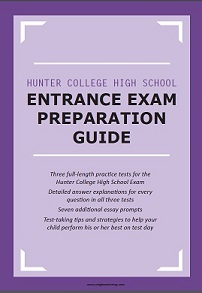ACT or SAT? Which test should NYC students take?
/The end of school year is almost here. Your sophomore son or daughter will be a junior in a just a few short months and that means it’s time to get serious about college admissions. You already know that one of the major components of a college application is the applicant’s standardized test score, so you are probably researching test preparation options for the SAT right now.
But hold on – why the SAT? Sure, here in New York City the preference has always been for the SAT, but why is that exactly? Probably sheer numbers. In 2010, 161,139 students across New York State took the SAT whereas only about one-third that many (50,262) chose the ACT Your child’s friends, friends’ children, and just about every child who ever grew up in your neighborhood took the SAT, so it’s only natural that you don’t even recognize there is a choice. But there is, and the differences between the tests can have a significant impact on your child’s score.
Let’s start with the content differences between the two tests.
SAT
ACT
49 questions in 2 sections 35 minutes total More emphasis on styleEnglish75 questions in 1 section 45 minutes total More emphasis on punctuation
54 questions in 3 sections 70 minutes total Some fill-in-your-own-answer questions Formulas for geometry are givenMath60 questions in 1 section 60 minutes total Harder content than on the SAT (for example, logarithms, trigonometry, unit circles, sine waves, matrices, and 3D graphing)
67 questions in 3 sections 70 minutes total 19 of the questions are vocabulary based Some questions compare and contrast two passages Questions occur in the order the answers appear in the passageReading40 questions in 1 section 35 minutes total Passages are all roughly the same length and always occur in the order of prose fiction, social sciences, humanities, and natural science Questions are in random order
Not applicableScience40 questions in 1 section 35 minutes total Test students’ ability to interpret and synthesize charts, graphs, and text. Very little memorized science knowledge is required
Mandatory. Topics are more philosophical and abstract.EssayOptional. Topics relate to the lives of high school students.
A simple comparison of content might lead you to believe that if your child is more mathematically-minded, then the ACT is best. However, choosing the right test is about much more than content. For example, because there is much less fluctuation among scores when students take the ACT multiple times (each is only on a scale 1 – 36), college admissions officers care more about the composite score on the ACT than they do the four individual scores. So even if math is a weakness for your child, if he has stellar scores in the other three subject areas, the ACT might be a better option than the SAT. However, the scoring of the SAT (the scale is 200 – 800 per section) makes superscoring (selecting the highest score in each category if a student has taken the SAT multiple times) much easier for colleges, so the three individual scores often hold more importance on the SAT. Here are some other considerations:
The ACT questions are less complicated.
The SAT is more of a reasoning test, while the ACT is more of a content test. Students who struggle with word problems, logic puzzles, or determining the author’s opinion from a reading passage will likely have a more difficult time with the SAT. Students who can easily adapt their test-taking style to incorporate more tricks and strategies designed to beat the test perform better on the SAT. Conversely, students who can sit and memorize grammar rules and math formulas have an easier time with the ACT.
The SAT loves vocabulary.
If your child is a walking dictionary, the SAT might be a better choice. Not only are there 19 questions in the reading comprehension sections that overtly test vocabulary, but many of the tone and description questions about the passages also indirectly test vocabulary. These vocabulary questions are a great way for some students to boost their reading comprehension score. ACT reading, on the other hand, primarily tests the students’ ability to interpret passages.
The time constraints on the ACT are intimidating.
Students have an average of one minute per math question on the ACT, and far less than one minute per question on the reading and science sections, especially after time spent reading passages and analyzing charts and graphs. This type of pressure is crippling for some students who aren’t able to guess strategically or jump around within a section to answer just the questions that reflect their strengths. The SAT is much more relaxed, with over a minute per question for all question types, although it is a longer test overall.
The SAT provides more variety during the test.
The SAT spreads out the different question types. Students may have a math section, then a reading section, then another math section, and then some grammar. On the ACT, students answer all questions of one particular type at a time. Some students prefer having the math questions broken up into segments so that they have time to refresh their minds and get energized. Others are bothered by this structure and just want to have all the math questions done and over with at once. Structural issues such as these can have a real impact on a student’s overall performance.
So really, what’s the best way to determine which test will give your child the greatest chance of success? Certainly assessing your child’s academic strengths and weaknesses, as well as his learning style, can help, and that is a conversation you can easily have with your child. In addition, having your child work on some practice content from both tests will also be highly beneficial. The websites for both the SAT test and the ACT test (offer free practice content. In addition, if your child has already taken the PSAT or the PLAN, you can use the score reports to compare where his performance on those tests places him in relation to other students around the country.
If you are considering hiring a ACT test prep tutor or a SAT test prep tutor, Origins Tutoring can help. Our hand-picked, expert and experienced test prep coaches can help each student maximize his or her score in a supportive, productive and stress-free learning environment. Please call us at 917.287.7927 so we can begin to develop a personalized test prep program for your child.



